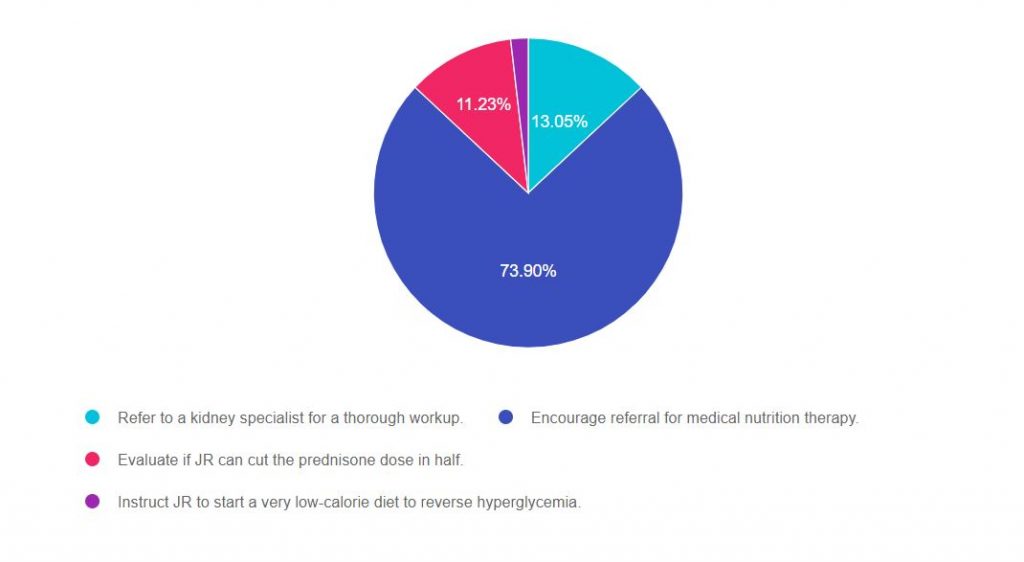
Most of you, 73%, chose the best answer for our April 27th Question of the Week. Great job! We wanted to “take a closer look” into this question.
Before we start though, if you don’t want any spoilers and haven’t tried the question yet, you can answer below: Answer Question
Question: JR is a 38 yr old who received a kidney transplant 3 months ago and has a GFR >60 and creatinine of 0.9. JR takes prednisone 10mg daily as part of the post-transplant protocol. JR’s most recent A1c came back at 7.9% and the provider asks the Diabetes Specialist what intervention is recommended.
Which of the following is the best response?
Answer Choices:
- Refer to a kidney specialist for a thorough workup.
- Encourage referral for medical nutrition therapy.
- Evaluate if JR can cut the prednisone dose in half.
- Instruct JR to start a very low-calorie diet to reverse hyperglycemia.

As shown above, the most common choice was option 2, the second most common answer was option 1, then option 3, and finally option 4.
Getting to the Best Answer
If you are thinking about taking the certification exam, the content of this practice test question will set you up for success. The exam will present questions that require test takers to be familiar with identifying common diabetes co-conditions, screening guidelines and interventions.
Answers & Rationale
Answer 1 is incorrect, 13.05% chose this answer, “Refer to a kidney specialist for a thorough workup.” As many as 10-40% of solid organ transplant recipients develop post-transplant diabetes (PTDM). This is due to a combination of genetic susceptibility plus the anti-rejection medications, including steroid therapy (see slide below). Since JRs kidney function is terrific based on his GFR and creatinine, referring to a kidney specialist is not warranted. However, referring to DSME is high on the list of priorities.
Answer 2 is correct, 73.90% of you chose this answer, “Encourage referral for medical nutrition therapy.” YES, this is the BEST answer. For any person experiencing post-transplant diabetes, they will need a referral to an RD/RDN and DSME program to learn diabetes self-management strategies. They will also need medication therapy, but there is currently no standard treatment approach due to the complexities of mixing transplant medications with diabetes therapies. However, insulin therapy is a safe and effective option for those experiencing post-transplant hyperglycemia.
Answer 3 is incorrect, 11.23% of you chose this answer, “Evaluate if JR can cut the prednisone dose in half.” Prednisone therapy is a critical intervention to prevent post-transplant rejection. For this reason, maintaining prednisone therapy is a priority. Diabetes specialists can help determine strategies to keep glucose on target to prevent infection, support graft health and limit other complications.
Answer 4 is incorrect, 1.82% of you chose this answer, “Instruct JR to start a very low-calorie diet to reverse hyperglycemia.” To maintain graft function and quality of life post-transplant, a very low-calorie diet is not recommended. To address this JR’s treatment plan will include a combination of healthy eating, activity plus diabetes medications.
We hope you appreciate this week’s rationale! Thank you so much for taking the time to answer our Question of the Week and participate in this fun learning activity!
Want to learn more about this question and more?
Enroll in our Level 2 – Critical Assessment – Fine-Tuning your Diabetes Detective Skills – 2.0 CEs

Diabetes Education Services Online University Courses are an excellent way to study for your exam anytime and anywhere that is convenient for you. You will have immediate access to your courses for 1 year after your purchase date. Each individual online course includes a: 90-minute video presentation, podcast, practice test, and additional resources.
This course integrates the ADA Standard of Care on elements of a comprehensive medical assessment (Standard 4) of the individual living with prediabetes, diabetes, or hyperglycemia. Through case studies and real-life situations, we discover often hidden causes of hyperglycemia and other complications, such as liver disease, sleep apnea, pancreatitis, autoimmune diseases, fractures, and more. We delve into therapy for complicated situations and discuss management strategies for other conditions associated with hyperglycemia such as Cystic Fibrosis, and Transplants. Join us for this unique and interesting approach to assessing and evaluating the hidden complications of diabetes.
Topics Include:
- Identify common yet often underdiagnosed complications associated with type 1 and type 2 diabetes.
- State strategies to identify previously undiscovered diabetes complications during assessments.
- Discuss links between hyperglycemia and other conditions including, transplant, cystic fibrosis and liver disease.
Intended Audience: A great course for healthcare professionals who want to learn the steps involved in providing a thorough lower extremity assessment.
Instructor: Beverly Thomassian RN, MPH, CDCES, BC-ADM is a working educator and a nationally recognized diabetes expert.
Can’t join live? No worries, we will record the webinar and post it to the Online University!
Sign up for Diabetes Blog Bytes – we post one daily Blog Byte from Monday to Friday. And of course, Tuesday is our Question of the Week. It’s Informative and FREE! Sign up below!
[yikes-mailchimp form=”1″]Accreditation: Diabetes Education Services is an approved provider by the California Board of Registered Nursing, Provider 12640, and Commission on Dietetic Registration (CDR), Provider DI002. Since these programs are approved by the CDR it satisfies the CE requirements for the CDCES regardless of your profession.*
The use of DES products does not guarantee the successful passage of the CDCES exam. CBDCE does not endorse any preparatory or review materials for the CDCES exam, except for those published by CBDCE.








